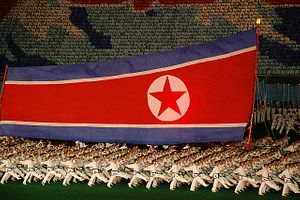North Korea’s recent alleged “H-bomb” test in flagrant violation of United Nations resolutions set off the predictable flurry of shock, outrage, condemnation, and expressions of determination around the globe. We are now well into the equally predictable hand-wringing and token wrist-slapping phase. Everyone but North Koreans agrees that a nuclear North Korea is intolerable; everyone also – no doubt including North Koreans – believes that nothing can be done about it.
Or can it?
Certainly the international community’s standard bag of tricks is not up to the task. North Korea is already almost entirely sanctioned, and therefore immune to further economic pain. Kim Jong-un appears to believe (probably correctly) that having even just a small, low-quality nuclear arsenal will deter foreign military action. Condemnation and largely symbolic sanctions merely feed the “they are out to get us” narrative that justifies both Kim’s iron grip on power and the very nuclear program that the world would like to reverse. If anything is going to work, it would have to be something very much outside the box.
It is probably a safe assumption that if Kim Jong-un values anything more than having a nuclear arsenal, it is staying in power. If he could be brought to believe that his nuclear weapons threatened rather than served that higher goal, he might be willing to give them up. The trick would be to do this without the threat of external force, which merely plays to the regime’s strengths.
The alternative to external force is internal force.
Now, the international community does not, of course, have the capacity to engineer a coup or revolution directly. But it does have the capacity to sow internal seeds of doubt about whether supporting Kim is a wise long-term bet. For this it would be necessary to dangle the prospect of a better bet, and threatening to dangle that better bet would be the key to persuading Kim to reconsider his nuclear ambitions.
Here is how it would work.
First, the international community would quietly communicate to Kim Jong-un that he has six months to agree to a practical program of denuclearization, in return for which he would receive a basket of guarantees and economic rewards that he can publicly represent to the people of North Korea as the fruits of a major behind-the-scenes diplomatic victory. If he does not agree, the UN General Assembly would vote to declare the North Korean seat empty and invite a new government in exile to occupy it. The members of the General Assembly who vote in favor and who currently host North Korean missions would then invite the new government in exile to take possession of them, declaring Kim’s representatives personae non gratae. What would follow would be a carefully staged series of negotiations and agreements with the “new” North Korean regime promising a normalization of relations, enhanced opportunities for economic cooperation, and human rights guarantees. The new regime, in turn, would grant amnesty to those senior members of the North Korean government and military that abandoned ship, and promise International Criminal Court indictments for those that did not.
North Korea is not so hermetically sealed anymore that word would not get around quickly that there is another path to a better future, and those in the best position to topple Kim would certainly perceive a personal interest in doing so – particularly those whose knives are already halfway out of their sheaths.
Predictably, Kim Jong-un would react with outrage, defiance, and bizarre threats. But practically speaking, there is nothing he could do. Lashing out would only trigger the very doom he seeks to avoid. He would be pinned on the horns of a dilemma, and if he were rational, he would choose to cooperate.
This approach has no perfect precedent, of course; but neither did anything else that was tried for the first time. The two main elements do have at least imperfect precedents: widely recognized governments in exile were common during World War II, and a General Assembly vote in 1971 yanked the China seat out from under Chiang Kai-shek in Taiwan. Arguably, the legal case for pulling recognition from Kim Jong-un would be even stronger today than at any time in history: The international community is, in effect, a club, and membership comes with more obligations – both to one’s own people and to the international community as a whole – than ever before. In terrorizing his own citizens and flagrantly ignoring UN resolutions, Kim has already effectively declared his own illegitimacy.
Obvious important practical questions arise. The biggest one is whether China could be brought on board. China plays a key role in the politics of the Korean peninsula, being Kim’s sole enabler, and China fears both chaos in North Korea and a united Korea with a strong American presence once the dust has settled. It would be vital to let China play a leading role in the entire episode, including the selection and perhaps also the hosting of North Korea’s government in waiting. China would have to be allowed a major say in what a post-Kim North Korea would look like. China (and others) would have to be given credible assurances that these particular measures would not themselves serve as precedents, on the principle that an exceptional circumstance requires an exceptional response.
At the very least, working out the details of such a plan would galvanize a degree of regional cooperation on the North Korean nuclear issue that is long missing and sorely needed.
With luck, just the quiet threat would prompt Kim Jong-un to fall into line. If not, with equal luck, it would prompt his quiet fall.
David A. Welch is CIGI Chair of Global Security at the Balsillie School of International Affairs, Professor of Political Science at the University of Waterloo, and Senior Fellow at the Centre for International Governance Innovation.

































